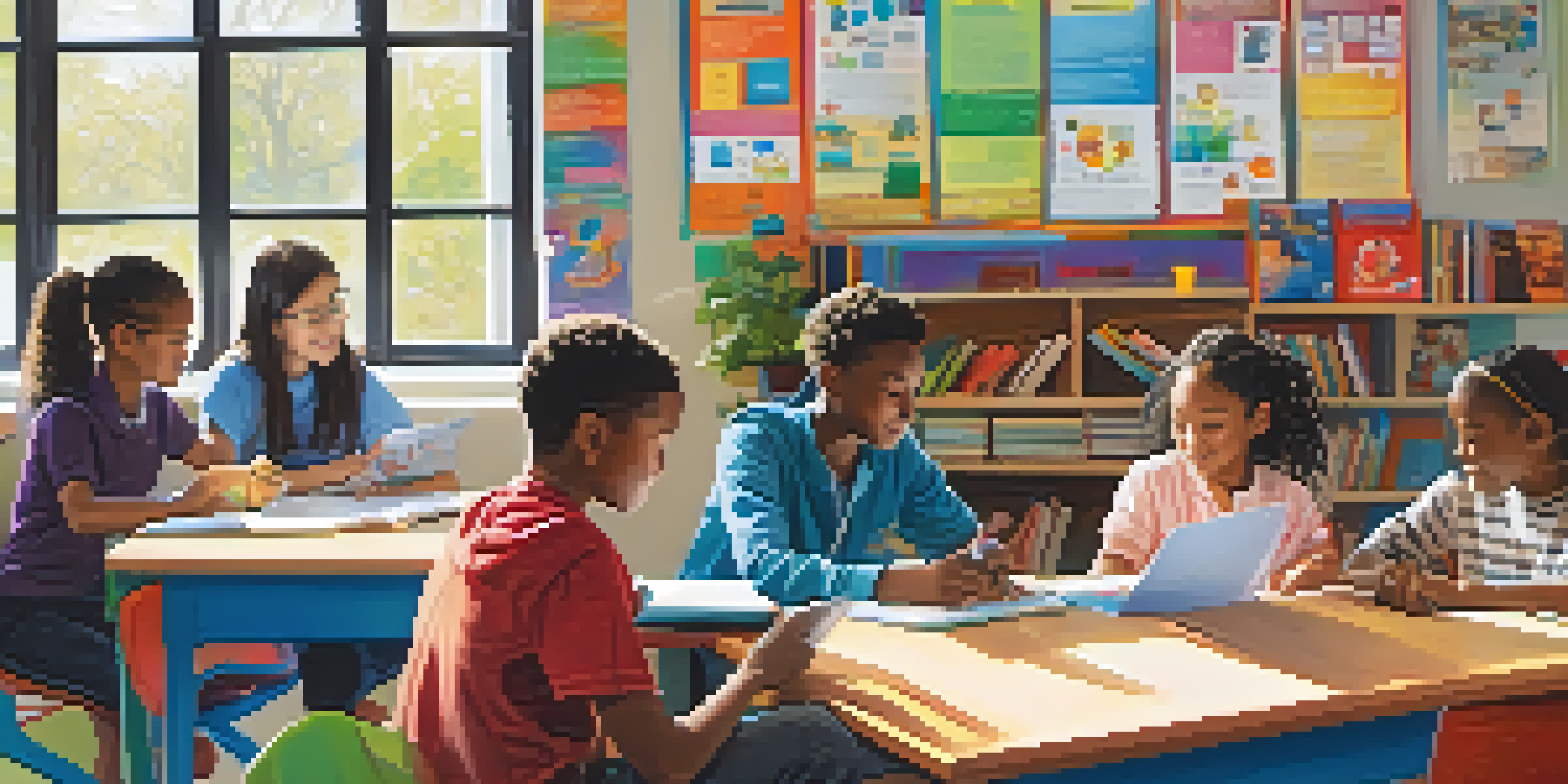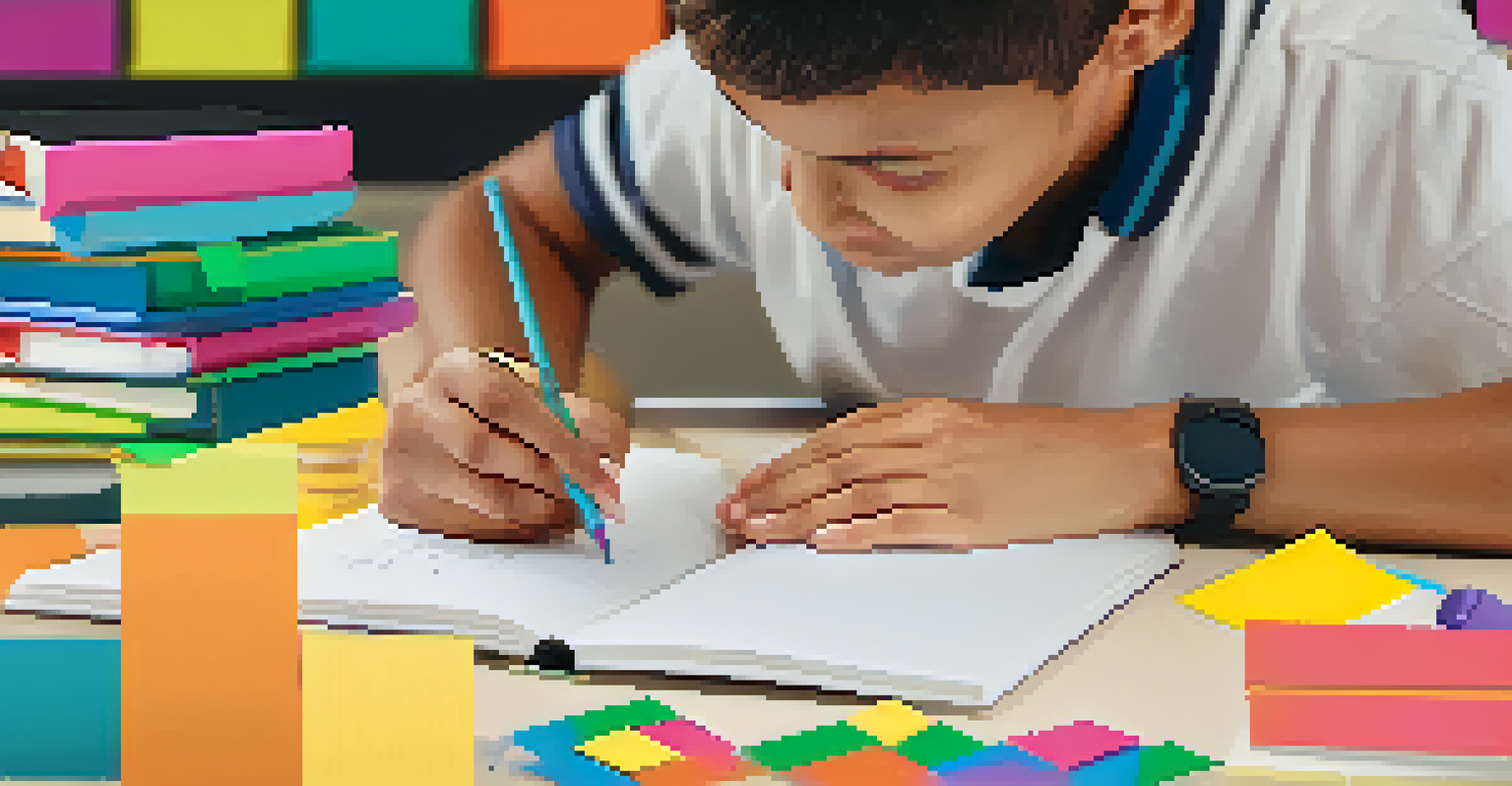The Impact of Personalized Learning on Student Motivation

Understanding Personalized Learning and Its Approach
Personalized learning tailors educational experiences to individual student needs, interests, and strengths. This approach shifts away from the one-size-fits-all model, recognizing that each student learns differently. By leveraging technology and adaptive resources, educators can create customized pathways that resonate with students, making learning more relevant and engaging.
Personalized learning is not a trend; it’s a shift in how we think about teaching and learning.
At its core, personalized learning emphasizes student agency, allowing them to take charge of their educational journey. This sense of ownership can lead to increased motivation, as students feel more connected to their learning objectives. For instance, when a student selects a topic they are passionate about, they are likely to invest more effort and enthusiasm into their studies.
Furthermore, personalized learning often incorporates formative assessments, which provide ongoing feedback tailored to each student's progress. This helps students understand their strengths and areas for improvement, fostering a growth mindset. Ultimately, personalized learning not only improves knowledge retention but also cultivates a more motivated and engaged student body.
The Role of Student Choice in Motivation
One of the most powerful aspects of personalized learning is the emphasis on student choice. When students have the opportunity to choose what and how they learn, they are more likely to feel invested in their education. This autonomy can lead to increased motivation, as students are more engaged when they are pursuing subjects that spark their interest.

For example, consider a classroom where students can select from various project topics. A student interested in environmental science may choose to research renewable energy, while another might explore wildlife conservation. This variety allows for deeper engagement, as students can connect their learning to their passions, making the experience more meaningful.
Personalized Learning Empowers Students
By tailoring educational experiences to individual needs and interests, personalized learning fosters student agency and motivation.
Moreover, allowing students to set their own goals fosters a sense of responsibility and accountability for their learning. As they work towards these goals, they develop intrinsic motivation, which is far more powerful than external rewards. When students see their efforts translate into achievement, it reinforces their desire to learn and succeed.
Tailoring Learning Experiences to Individual Needs
Personalized learning recognizes that students come with diverse backgrounds, skills, and learning styles. By tailoring educational experiences to meet these individual needs, educators can create an environment where all students can thrive. This not only boosts motivation but also enhances overall academic performance.
The more choices students have in their learning, the more they will feel a sense of ownership and responsibility for their education.
For instance, a student who struggles with reading comprehension may benefit from visual aids and interactive activities that make the material more digestible. In contrast, another student who excels in math may be given more challenging problems to keep them engaged. This attention to individual needs ensures that no student is left behind, which can significantly impact their motivation to learn.
Additionally, when students feel supported and understood, they are more likely to take risks in their learning. This willingness to step outside their comfort zone can lead to deeper exploration and a greater desire to learn. Ultimately, a tailored approach helps students build confidence in their abilities, which is a crucial factor in maintaining motivation.
Feedback and Its Importance in Personalized Learning
Feedback is a cornerstone of personalized learning, providing students with essential insights into their progress. Unlike traditional assessments, personalized feedback is often timely and specific, allowing students to understand their strengths and areas for improvement. This continuous loop of feedback can significantly enhance motivation.
When students receive constructive feedback, they can see the impact of their efforts and adjust their strategies accordingly. For example, a student who receives feedback on a writing assignment can identify specific areas to work on, leading to a sense of achievement when they see improvement in their next piece. This cycle of feedback fosters a growth mindset, encouraging students to embrace challenges rather than shy away from them.
Feedback Drives Student Growth
Timely and specific feedback helps students understand their progress, reinforcing a growth mindset and enhancing motivation.
Moreover, feedback also promotes a sense of connection between students and educators. When teachers take the time to provide personalized insights, students feel valued and understood. This relationship can further enhance motivation, as students are more likely to engage when they know their teachers are invested in their success.
The Connection Between Collaboration and Motivation
Personalized learning often encourages collaborative learning experiences, which can be incredibly motivating for students. Working alongside peers allows students to share ideas, challenge each other, and learn from diverse perspectives. This collaborative environment can foster a sense of belonging, which is crucial for motivation.
For instance, group projects in a personalized learning setting can ignite excitement among students as they combine their strengths to achieve a common goal. When students collaborate on a project that interests them, they are more likely to stay engaged and contribute actively. The social aspect of learning can enhance their motivation, as they feel connected to their peers.
Furthermore, collaboration helps students develop essential social skills, such as communication and teamwork. These skills are not only vital for academic success but also for future career opportunities. As students learn to work together, they gain confidence in their abilities and are motivated to participate more actively in their learning journeys.
Real-World Applications and Authentic Learning
Personalized learning often incorporates real-world applications, connecting classroom learning to students' lives outside of school. This relevance can significantly boost motivation, as students see the direct impact of their education on their future. When students understand how their studies apply to the real world, they are more likely to engage fully.
For example, a personalized learning curriculum may involve projects that address community issues, allowing students to conduct research and propose solutions. This hands-on approach not only reinforces academic concepts but also empowers students to make a difference in their communities. The sense of purpose derived from these projects can elevate motivation levels.
Collaboration Enhances Engagement
Collaborative learning experiences foster a sense of belonging and social connection, which can significantly boost student motivation.
Moreover, engaging with real-world scenarios helps students develop critical thinking and problem-solving skills. As they navigate complex issues, they gain confidence in their abilities to think independently. This newfound confidence can translate into a greater desire to learn, as students recognize the value of their education in shaping their future.
Measuring the Impact of Personalized Learning on Motivation
To truly understand the impact of personalized learning on student motivation, it's essential to measure its effectiveness. Various assessment tools and surveys can provide insights into how personalized approaches influence student engagement and performance. These metrics can help educators refine their strategies and ensure they meet the needs of their students.
For instance, tracking student progress over time can reveal patterns in motivation levels. If students consistently show improvement in areas where personalized learning is implemented, this serves as a strong indicator of its effectiveness. Additionally, gathering feedback from students about their experiences allows educators to make informed adjustments to their teaching methods.

Ultimately, measuring the impact of personalized learning on motivation not only benefits students but also informs best practices for educators. By using data-driven insights, teachers can create an environment that maximizes student engagement and fosters a lifelong love of learning.